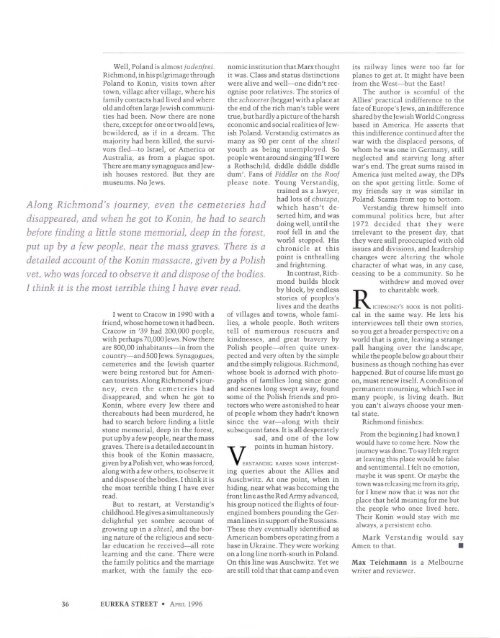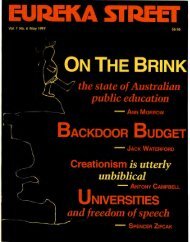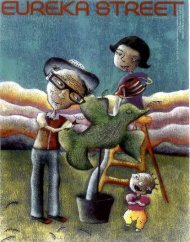Shane Malone - Eureka Street
Shane Malone - Eureka Street
Shane Malone - Eureka Street
You also want an ePaper? Increase the reach of your titles
YUMPU automatically turns print PDFs into web optimized ePapers that Google loves.
Well, Poland is almost judenftei.<br />
Richmond, in his pilgrimage through<br />
Poland to Konin, visits town after<br />
town, village after village, where his<br />
family contacts had lived and where<br />
old and often large Jewish communities<br />
had been. Now there are none<br />
there, except for one or two old Jews,<br />
bewildered, as if in a dream . The<br />
m ajority had been killed, the survivors<br />
fl ed-to Israel, or America or<br />
Australia, as from a plague spot.<br />
There are many synagogues and Jewish<br />
houses restored. But they are<br />
museums. No Jews.<br />
Along Richmond's journey, even the cemeteries had<br />
disappeared, and when he got to Konin, he had to search<br />
befme finding a little stone memorial, deep in the forest,<br />
put up by a few people, near the mass graves. There is a<br />
detailed account of the Konin massacre, given by a Polish<br />
vet, who was forced to observe it and dispose of the bodies.<br />
I think it is the most terrible thing I have ever read.<br />
I went to Cra cow in 1990 with a<br />
friend, whose home town it had been.<br />
Cracow in '39 had 200,000 people,<br />
with perhaps 70,000 Jews. Now there<br />
arc 800,00 inhabitants- in from the<br />
country-and 500 Jews. Synagogues,<br />
cemeteries and the Jewish quarter<br />
were being restored but for America<br />
n tourists. Along Richmond's journ<br />
ey, even the cemeteries had<br />
disappeared, and when he got to<br />
Konin, where every Jew there and<br />
thereabouts had been murdered, he<br />
had to search before finding a little<br />
stone memorial, deep in the forest,<br />
put up by a few people, near the mass<br />
graves. There is a detailed account in<br />
this book of the Konin massacre,<br />
given by a Polish vet, who was forced,<br />
along with a few others, to observe it<br />
and dispose of the bodi es. I think it is<br />
the most terrible thing I have ever<br />
read.<br />
But to restart, at Verstandig's<br />
childhood. He gives a simultaneously<br />
delightful yet sombre account of<br />
growing up in a shteLl, and the boring<br />
nature of the religious and secular<br />
education he received-all rote<br />
learning and the cane. There were<br />
the family politics and the marriage<br />
market, with the family the eco-<br />
nomic institution that Marx thought<br />
it was. Class and status distinctions<br />
were alive and well- one didn't recognise<br />
poor relatives. The stories of<br />
the clmorret (beggar) with a place at<br />
the end of the rich man's table were<br />
true, but hardly a picture oft he harsh<br />
economic and social realities of Jewish<br />
Poland. Verstandig estimates as<br />
many as 90 per cent of the shtetl<br />
youth as being unemployed. So<br />
people went around singing 'If I were<br />
a Rothschild, diddle diddle diddle<br />
dum'. Fans of Fiddlet on the Roof<br />
please n ote. Young Verstandig,<br />
trained as a lawyer,<br />
had lots of chutzpa,<br />
which hasn ' t deserted<br />
him, and was<br />
doing well, until the<br />
roof fell in and the<br />
world stopped. His<br />
chronicle at this<br />
point is enthralling<br />
and frightening.<br />
In contrast, Richm<br />
ond builds block<br />
by block, by endless<br />
stories of peoples's<br />
lives and the deaths<br />
of villages and towns, whole fa milies,<br />
a whole people. Both writers<br />
tell of num erou s rescuers and<br />
kindnesses, and great bravery by<br />
Polish people-often quite unexpected<br />
and very often by the simple<br />
and the simply religious. Richmond,<br />
whose book is adorned with photographs<br />
of families long since gone<br />
and scen es long swept away, found<br />
some of the Polish friends and protectors<br />
who were astonished to hear<br />
of people whom they hadn't known<br />
since the war- along with their<br />
subsequent fates. It is all desperately<br />
sad, and one of the low<br />
"'\ T points in human history.<br />
v ERSTANDIG RAI SES SOME interesting<br />
queries about the Allies and<br />
Auschwitz. At one point, when in<br />
hiding, near what was becoming the<br />
front line as the Red Army advanced,<br />
his group noticed the flights of fourengined<br />
bombers pounding the German<br />
lines in support of the Russians.<br />
These they eventually identified as<br />
American bombers operating from a<br />
base in Ukraine. They were working<br />
on a long line north-south in Poland.<br />
On this line was Auschwitz. Ye t we<br />
are still told that that camp and even<br />
its railway lines were too far for<br />
planes to get at. It might have been<br />
from the West- but the East<br />
T he author is scornful of the<br />
Allies' practical indifference to the<br />
fate of Europe's Jews, an indifference<br />
shared by the Jewish World Congress<br />
based in America. He asserts that<br />
this indifference continued after the<br />
war with the displaced persons, of<br />
whom he was one in Germany, still<br />
neglected and starving long after<br />
war's encl. The great sums raised in<br />
America just mel ted away, the DPs<br />
on the spot ge tting little. Some of<br />
my friends say it was similar in<br />
Poland. Scams from top to bottom.<br />
Vcrstanclig threw himself in to<br />
communal politics here, but after<br />
19 72 cl ecicle cl that they were<br />
irrelevant to the present day, that<br />
they were still preoccupied with old<br />
issues and divisions, and leadership<br />
changes were altering the whole<br />
character of what was, in any case,<br />
ceasing to be a community. So he<br />
withdrew and m oved over<br />
to charitable work.<br />
R<br />
I CI~M ON D' S 1\00K is not political<br />
in the sam e way. He lets his<br />
interviewees tell their own stories,<br />
so yo u get a broader perspective on a<br />
world that is gone, leaving a strange<br />
pall hanging over the landsca pe,<br />
while the people below go about their<br />
business as though nothing has ever<br />
happened. But of course life must go<br />
on, must renew itself. A condition of<br />
permanent mourning, which I see in<br />
many people, is living death. But<br />
you can't always choose your mental<br />
state.<br />
Richmond finishes:<br />
From the beginning I had known I<br />
would have to co me here. Now the<br />
journey was done. To say I felt regret<br />
at leaving this place would be false<br />
and sentimental. I felt no emotion,<br />
ma ybe it was spent. Or may be th e<br />
town was releasing me from its grip,<br />
for I knew now that it was not the<br />
pl ace that held meaning for me but<br />
the people who once lived here.<br />
Their Konin would stay with me<br />
always, a persistent echo.<br />
Mark Verstanclig would say<br />
Amen to that.<br />
•<br />
Max Teichmann is a Melbourne<br />
writer and reviewer.<br />
36<br />
EUREKA STREET • APRI L 1996
















